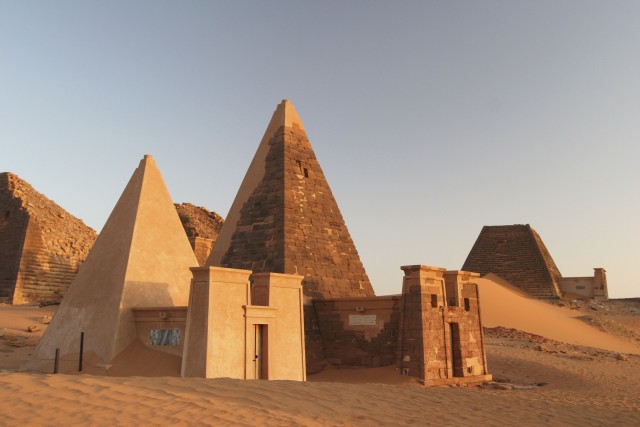Meroe
Located on the Nile River about 120 miles north of present-day KHARTOUM, the royal city of Meroe was the capital of the ancient kingdom of Kush. The kingdom arose in the region known as NUBIA (in what is now southern Egypt and northern Sudan) about 750 B.C. and flourished until the A.D. 300s. Although strongly influenced by Egypt, the Kushites eventually developed their own culture.
Meroe was inhabited by the 700s B.C., but at that time the Kushite rulers lived and were buried in the city of Napata to the north. Later, perhaps in the 600s B.C., the royal residence and administrative center of Kush moved to Meroe, which became the new capital. However, the city did not become the burial site for Kushite royalty until around 300 B.C.

Scholars know little about the organization of the Meroitic state. They do know that its monarchy was similar to that of Egypt and that its rulers—some of them women—were closely identified with gods. Many of the deities pictured on the walls of temples and pyramid chapels were Egyptian in origin, but there were also purely Meroitic gods, such as the lion-headed Apedemek.
Meroe was an important urban center. In its heyday it was the largest city in Africa south of Egypt, with elaborate stone palaces and temples as well as areas where the common people built their mud-brick dwellings. The city was noted for its industries, especially for ironworking. Meroitic craftspeople also produced pottery in a variety of Nubian, Egyptian, and Mediterranean styles and made glass and cloth. The earliest inscriptions in the city were Egyptian hieroglyphics, but by the 200s B.C. the people of Meroe had developed a version of Egyptian script in which to write their own language. Scholars have not succeeded in translating these texts.
The last royal burials at Meroe date from around A.D. 350. Archaeologists think that the Meroitic state came to an end at that time, perhaps as a result of war campaigns in Meroitic territory by Aezanes Aksum, king of Ethiopia. (See also Aksum; Egypt, Ancient; Sudan.)